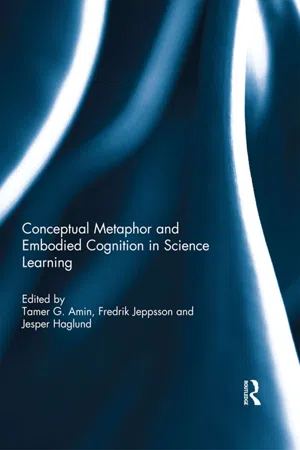
Conceptual metaphor and embodied cognition in science learning
- 256 pages
- English
- ePUB (mobile friendly)
- Available on iOS & Android
Conceptual metaphor and embodied cognition in science learning
About This Book
Scientific concepts are abstract human constructions, invented to make sense of complex natural phenomena. Scientists use specialised languages, diagrams, and mathematical representations of various kinds to convey these abstract constructions. This book uses the perspectives of embodied cognition and conceptual metaphor to explore how learners make sense of these concepts. That is, it is assumed that human cognition – including scientific cognition – is grounded in the body and in the material and social contexts in which it is embedded. Understanding abstract concepts is therefore grounded, via metaphor, in knowledge derived from sensory and motor experiences arising from interaction with the physical world.
The volume consists of nine chapters that examine a number of intertwined themes: how systematic metaphorical mappings are implicit in scientific language, diagrams, mathematical representations, and the gestures used by scientists; how scientific modelling relies fundamentally on metaphor and can be seen as a form of narrative cognition; how implicit metaphors can be the sources of learner misconceptions; how conceptual change and the acquisition of scientific expertise involve learning to coordinate the use of multiple implicit metaphors; and how effective instruction can build on recognising the embodied nature of scientific cognition and the role of metaphor in scientific thought and learning. The volume also includes three extended commentaries from leading researchers in the fields of cognitive linguistics, the learning sciences, and science education, in which they reflect on theoretical, methodological and pedagogical issues raised in the book. This book was originally published as a special issue of the International Journal of Science Education.
Frequently asked questions
Information
Table of contents
- Cover
- Half Title
- Title
- Copyright
- Contents
- Citation Information
- Notes on Contributors
- Conceptual Metaphor and Embodied Cognition in Science Learning: Introduction
- 1. The Importance of Language in Students’ Reasoning About Heat in Thermodynamic Processes
- 2. Varying Use of Conceptual Metaphors across Levels of Expertise in Thermodynamics
- 3. On Conceptual Metaphor and the Flora and Fauna of Mind: Commentary on Brookes and Etkina; and Jeppsson, Haglund, and Amin
- 4. Applying Conceptual Blending to Model Coordinated Use of Multiple Ontological Metaphors
- 5. Enacting Conceptual Metaphor through Blending: Learning activities embodying the substance metaphor for energy
- 6. Some Challenges in the Empirical Investigation of Conceptual Mappings and Embodied Cognition in Science Education: Commentary on Dreyfus, Gupta and Redish; and Close and Scherr
- 7. An Analysis of Metaphors Used by Students to Describe Energy in an Interdisciplinary General Science Course
- 8. Understanding Starts in the Mesocosm: Conceptual metaphor as a framework for external representations in science teaching
- 9. From Stories to Scientific Models and Back: Narrative framing in modern macroscopic physics
- 10. On the Significance of Conceptual Metaphors in Teaching and Learning Science: Commentary on Lancor; Niebert and Gropengiesser; and Fuchs
- 11. Conceptual Metaphor and the Study of Conceptual Change: Research synthesis and future directions
- Index